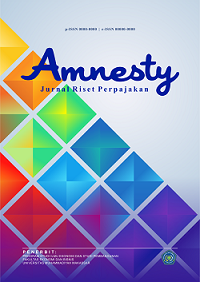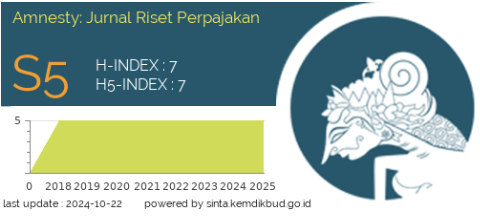Analysis of Tax Planning for Corporate Income Tax Case Study at PT.Victoria Care Indonesia Year 2022
DOI: https://doi.org/10.26618/jrp.v7i1.13696
Tax Planning, Streamline, Taxes
Abstract
The purpose of this study is to delve into the tax planning strategies employed by PT Victoria Care Indonesia, aimed at optimizing the company's tax liabilities. Tax planning is a crucial aspect of corporate finance, allowing businesses to strategically manage their tax obligations within the bounds of the law. Through meticulous planning and analysis, companies can identify opportunities to minimize tax burdens while remaining compliant with regulatory requirements. In this research, secondary data is utilized, drawing from various sources within PT Victoria Care Indonesia. The quantitative approach adopted facilitates a systematic examination of the company's tax planning practices. By employing descriptive analysis methods, the study provides a comprehensive overview of the tax planning landscape within the organization. The findings reveal significant efficiencies derived from the implementation of tax planning measures. Specifically, two key areas emerge as focal points of tax optimization: investment in human capital through training and development initiatives, and the provision of health benefits to employees in monetary form. These strategies not only contribute to enhancing employee welfare but also serve as effective tax planning tools, enabling the company to capitalize on tax incentives and deductions associated with such expenditures. Moreover, the study underscores the importance of integrating tax planning into broader corporate strategies, emphasizing its role as a proactive financial management tool rather than a reactive compliance exercise. By aligning tax planning efforts with organizational goals, PT Victoria Care Indonesia can not only minimize tax liabilities but also drive sustainable growth and profitability. In essence, this study sheds light on the nuanced complexities of tax planning within the context of corporate governance, underscoring its significance in optimizing financial performance and ensuring long-term viability for businesses operating in an increasingly intricate regulatory environment.
References
Achsani, N. A., Tambunan, M., & Mulyo, S. A. (2012). Impact of fiscal policy on the agricultural development in an emerging economy: Case study from the South Sulawesi, Indonesia. International Research Journal of Finance and Economics, 96, 101-112.
Akhmad, P. (2016). The impact of price subsidy policy of fertilizer on production, demand and supply of corn in Indonesia. American-Eurasian Journal or Sustainable Agriculture, 10(1), 29-37.
Arsal, M., HAMID, N. I. N. B. A., Arsal, R., & Basri, M. (2014). Consumer Behavior of the Islamic banking. International Journal of Science Commerce and Humanities, 59-64.
Arsal, M., & Arsal, D. (2019, August). Urban forest and financial resources perspective in Indonesia. In IOP Conference Series: Materials Science and Engineering (Vol. 593, No. 1, p. 012006). IOP Publishing.
Arsal, M. (2021). Impact of earnings per share and dividend per share on firm value. ATESTASI: Jurnal Ilmiah Akuntansi, 4(1), 11-18.
Rum, M. (2013). Locus of control, innovation, performance of the business people in the small business and medium industries in south Sulawesi. Journal of Economics, Business, & Accountancy Ventura, 15(3), 373-388.
Rum, M. (2016). Audit size, mandatory audit and time budget pressure on and audit risk and audit quality on practice of accounting users. European Journal of Social Sciences, 53(2), 201-215.
Rum, M. (2018, May). Cost Efficiency of Sea Freight and Lowering Cost of Consumption Goods. In IOP Conference Series: Earth and Environmental Science (Vol. 156, No. 1, p. 012020). IOP Publishing.
Budianti, Wiwik, & Ana, Ihda Okta Evi. (2016). IMPLEMENTASI TAX PLANNING TERHADAP PERHITUNGAN PPh BADAN PADA PT CITRA ABADI SEJATI. JIAFE (Jurnal Ilmiah Akuntansi Fakultas Ekonomi), 2(1), 66–76. https://doi.org/10.34204/jiafe.v2i1.688
Febria, Dian Nur, & Madjid, Suhirman. (2019). Analisis Penerapan Perencanaan Pajak (Tax Planning) PPH Pasal 21 sebagai Upaya Efesiensi Beban Pajak Wajib Pajak Badan. Majalah Sainstekes, 6(1), 20–30. https://doi.org/10.33476/ms.v6i1.1214
Jusriadi, E., Syafaruddin, S., & Rahmadianti, R. (2019). The Influence of Competence, Work Discipline and Salary on Nurses’ Job Satisfaction and Ability in Providing Service at PT. Zulu Alpha Papa Makassar. Proceeding UII-ICABE, 229-236.
Jusriadi, E., Syafaruddin, S., & Rusydi, M. (2021). Human capital development of research staff through self-leadership, teamwork management, and culture diversity. Jurnal Minds: Manajemen Ide dan Inspirasi, 8(1), 1-14.
Jusriadi, E. (2022). Moderation of Leadership Style: Management Accounting Information Systems and Management Control Systems on Managerial Performance. ATESTASI: Jurnal Ilmiah Akuntansi, 5(1), 16-32.
Kementerian Keuangan. (2022). Peraturan Menteri Keuangan Nomor 112/PMK.03/2022. Kementerian Keuangan Republik Indonesia, 1–22. Retrieved from https://jdih.kemenkeu.go.id/download/a7c0b23a-a5ac-482f-a89e-94a3d7eff74d/112~PMK.03~2022Per.pdf%0Ahttps://peraturan.bpk.go.id/Details/217310/pmk-no-112
Muaja, R. J., Sondakh, J., & Tangkuman, S. (2015). Analisis Penerapan Perencanaan Pajak Pada Wajib Pajak Badan Di Pt. Elsadai Servo Cons Tax Planning Implementation Analysis on the Body Mandatory Pt Elsadai Servo Cons. Analisis Penerapan Perencanaan… 82 Jurnal EMBA, 3(4), 82–91.
Raditya, Muhammad Helmi, Zulpahmi, & Sumardi. (2021). Analisis Penerapan Perencanaan Pajak Penghasilan PPh Badan dan Final Sebagai Upaya Mengefisienkan Beban Pajak Pada Perusahaan PT Lippo Karawaci Tbk Tahun 2017 – 2019. Jurnal Riset Mahasiswa Akuntansi, 9(2). https://doi.org/10.21067/jrma.v9i2.6091




